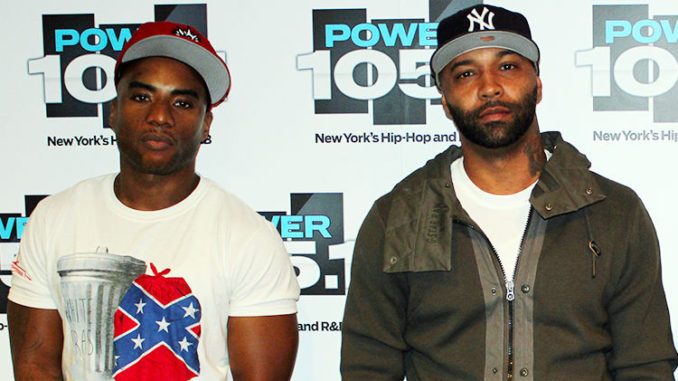
As the old saying goes, pioneers take the arrows, settlers take the land….Joe Budden, who was part of spearheading the wave of hip hop podcasters on streaming platforms, such as YouTube, had a lot to say in response to Charlamagne’s criticism of the rapper’s negotiation skills in his latest dealings with Spotify.
During a segment of Power 105’s Rumor Report, the Breakfast Club host commented, “It sounds to me like Joe Budden is a person who knows his worth, but doesn’t know how to properly negotiate it because if you keep doing deals with various corporations and you keep getting trash a– deals, that’s on you.”
He went on to discuss that vacations, bonuses and additional benefits, normally subjugated on employees not owners, should be discussed in the beginning of negotiations.
Then, he marginalized the value and impact of Budden’s podcast by saying his No. 1 hit show was not comparable to that of a Gimlet Media, which has a network of shows that are assumed by the host to be in the top 10.
DJ Envy politely disagreed with Charlamagne that Budden was making a mistake by walking away from Spotify. He responded, “That’s what he’s supposed to do.”
Listen To Charlamagne And DJ Envy Assess Joe Budden’s Exit From Spotify
Budden didn’t take too lightly to Charlamagne’s comments. The State of the Culture host went back on his podcast to address the situation.
“Charlamagne, let me help you, I know that you have this healthy obsession with me,” Budden said on the episode. “I know that you think we are competing. You might also think that we’re fighting the same fight. You would be sadly mistaken in all three of those.”
Budden, then, referenced the infamous Breakfast Club interview with Dame Dash where the serial entrepreneur attempted to explain the mindset of an owner versus that of an employee.
In true Joe Budden fashion, red-faced and veins popping, he proceeded to explain why he was so turnt about the situation.
“It bothers me that I’m steady fighting for proper value for n—– that’s afraid to fight for the value their f—— self — don’t interrupt my mission!” he so poetically pointed out.
He reminded listeners that he owns his podcast, whereas Charlamagne technically is under contract with iHeart as an employee.
“I’m on the phone with Charlamagne listening to my brother fight for oppression,” Budden said. “If you’re not funding your sh–, we’re not having the same talk.”
Throughout the 44-minute clip, Budden shared gems that are certain to be useful for content creators in the business of digital and tech industries.
Some gems from Joe Budden:
-Problem shared is problem solved.
-They’re using us.
-We affect Wall Street.
-It’s about Proof of Concept.
-They don’t know how to deal with us when we don’t want no money.
-They want to participate. You can’t edit our creative.
-Any ad put on this podcast have to be ran by — you guessed it, me!
-My time is my inventory.
-Never make some white person nine figures so they can offer you jewelry.
-Hov, Puffy, Byron Allen, Master P Kanye…All of the people that had to change status quo — they had to speak in codes.
News broke last week that Joe Budden’s popular podcast would no longer be featured on digital streaming service Spotify. Amid the break, Joe Budden made headlines when he publicly criticized Spotify for not respecting the value of what he built by offering him cash in an eight figure deal extending his podcast in exchange for the company taking equity and decision-making rights.
Yet, Spotify was still considered an “unproven prospect and platform in podcasting” being that its market share and intellectual property in the sector was small at the time Budden first joined, according to the Love and Hip Hop star.
Budden pointed out how Spotify failed to recognize the success of his podcast, which stood at No. 1 on their streaming service, after they didn’t give the trio, consisting of Mal, Rory and Joe, a bonus.
New episodes of the podcast will no longer be available on Spotify exclusively starting September 23.
Joe Budden Announces That He’s Leaving Spotify
Budden makes some solid and reasonable points. It doesn’t make sense to build something only to sell it and become the employee. This is common in the music industry where artists get played everyday for bringing their homegrown, independent art to a major record label only to become slave to the system under the restraints of ridiculous contract obligations and loans hidden under the guise of “advances.”
But, to be fair, white people sell what they build all the time. Elon Musk, for instance, built and sold his first software Blastar at the age of 12. Then, Musk sold start-up company Zip2 Corporation to Compaq for more than $300 million, giving him the stacks he needed to create another business idea. He would invent X.com, which later became PayPal. eBay would acquire PayPal, making Musk a billionaire. Musk wasn’t done though. He invented SpaceX and Tesla, Inc. and is running with the likes of Amazon founder Jeff Bezos and Microsoft founder Bill Gates. Some people got it like that. They have plenty of ideas, so getting a bag for one idea is not a big deal. But, if the ideas are slim to none, then it’s no wonder why the inventor or founder would hold so tightly to it.
At the same time, the Breakfast Club, as much as we adore the trio, has a history of mocking and laughing at individuals who have visited the show and attempted to elevate the mindsets there.
Soulja Boy is one pioneer of the digital and tech movement for rappers when it comes to using social media to boost their musical careers. Yet, he received the most flack and also seemed to not be taken seriously for his innovative ideas.
Dame Dash, is another person who came to the show and tried to explain that eventually the trio, DJ Envy, Charlamagne and Angela Yee, would have to think about ownership if they really wanted to be bosses. It wouldn’t be long before DJ Envy and Angela Yee would go into house flipping and opening a juice bar. Charlamagne would release books as he navigated pitching shows to major networks.
Ironically, a conversation involving Kanye West was contradictory as the Breakfast Club questioned why West couldn’t get his fashion line off the ground without the help of white-owned fashion companies. When he explained that he was being marginalized and locked out of the industry, he was told to just start selling t-shirts. Although it appeared that West wanted to be a part of the infrastructure that rejected him, his overall goal, as we see today, was to have equity and own his companies. Now, he’s a billionaire.
So, what’s the lesson here? As Budden said himself, “It doesn’t mean we’re not fighting the same fight, it just means we’re fighting it differently.” It always seems to be this way in the black community, where one side opposes the strategy of another. This can be dated back to the heydays when the same argument surrounded Martin Luther King Jr. and Malcolm X.
In this case, Charlamagne is Martin and Budden is Malcolm. At the end of the day, they are both successful and making moves. But, just don’t let it stop at iHeart or Spotify. As we’ve learned from Nick Cannon’s Viacom ordeal, fronting like you’re a boss when really you don’t own your sh– is worse than “your girl looking through your phone while you’re sleep.”




1 Trackback / Pingback
Comments are closed.